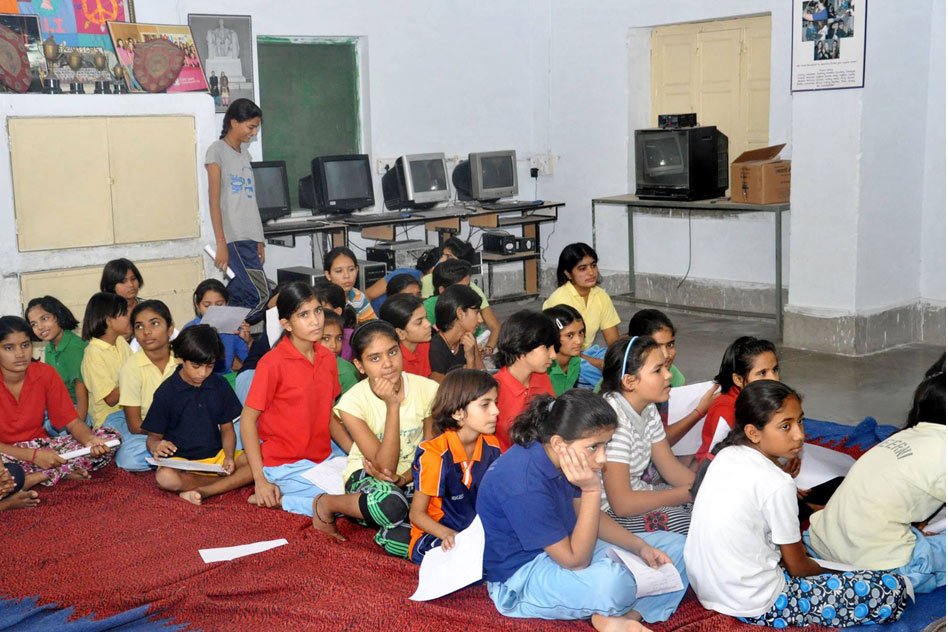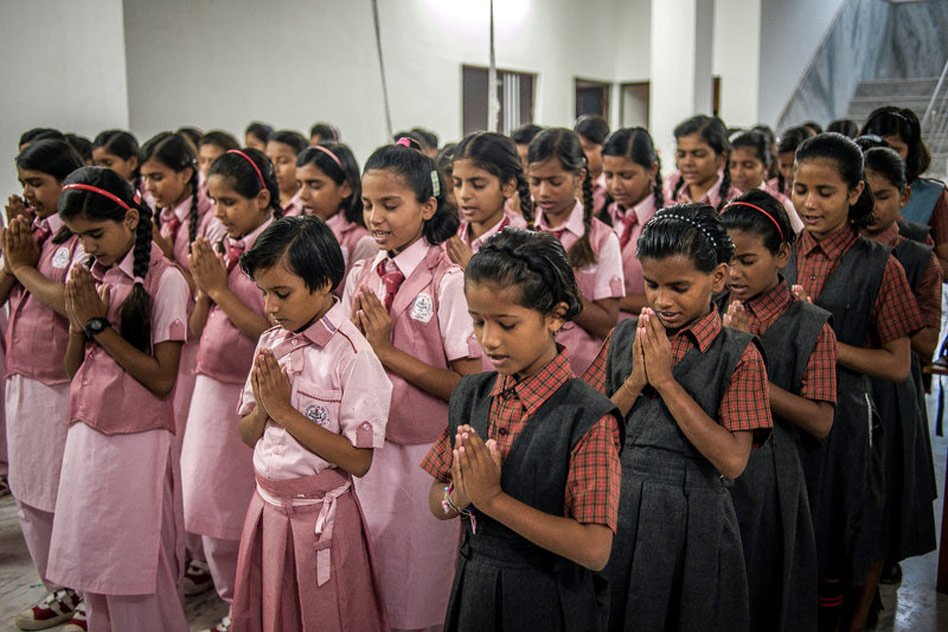
How An Unusual Boarding School In India Is Changing The Lives Of Child Brides
15 Nov 2015 3:12 PM GMT
Editor : Richa Verma Verma
I have done my graduation and post graduation in English Literature from Miranda House, Delhi University. Writing is my passion and I believe words have immense power which can shape the thoughts of an individual as well as the nation.
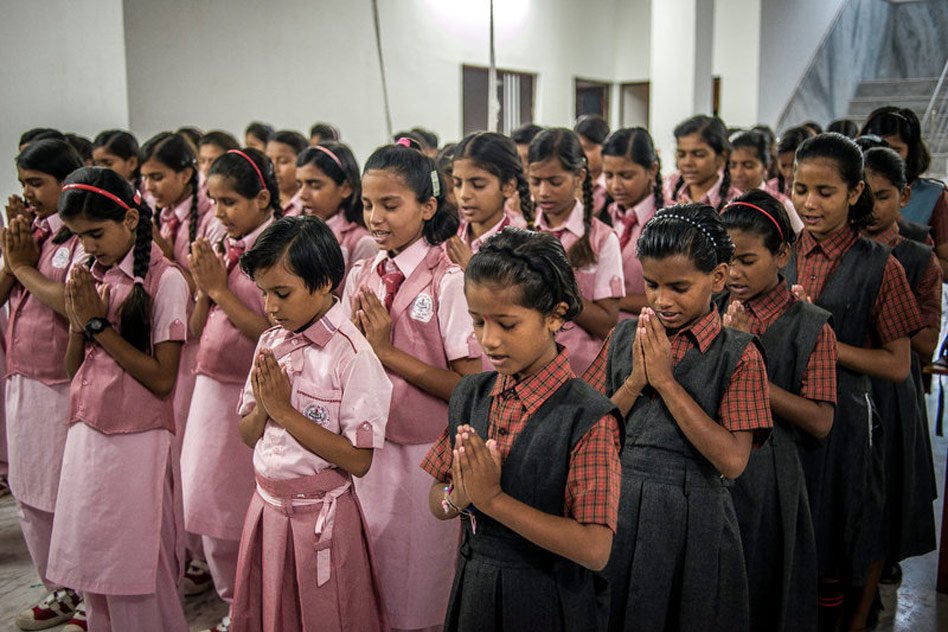 Girls start the day with a prayer at the Veerni Institute in Jodhpur, India. It’s a boarding school where nearly half the students are child brides. Poulomi Basu/VII Photo
Girls start the day with a prayer at the Veerni Institute in Jodhpur, India. It’s a boarding school where nearly half the students are child brides. Poulomi Basu/VII Photo
“In Hindi Veerni means heroine or woman of strength. The Veerni Project is guided by the core belief that when girls and women are educated and healthy, they will have the strength to create positive changes in their lives as well as their communities and gain economic independence”.
Veerni is a non-profit based in Jodhpur, Rajasthan, which was launched in early 1990 by the group’s founder, a Swiss national named Jacqueline de Chollet, providing access to health care and water and sanitation. It is a part of Veerni Project, a two-decade-old organization.
facebook/The-Veerni-Project
UNICEF estimates over 700 million women alive today were married as children, 1 in 3 girls in the developing countries of the world were married before 18 and entered sexual union, and if we do not take up arms against this evil social practice then by the end of the decade an estimated 142 million girls will be married as children
India ranks 14 in this list with 47% of women married below the age of 18. Due to its sheer population, it adds up to a third of the world’s child brides. Although the Prohibition of Child Marriage Act of India, 2006, makes it illegal for girls under 18 and boys under 21 to marry, inviting a jail term of 2 years, or fine of up to Rs 2,00,000, like many Acts in India, it remains confined to papers. Rural Rajasthan is not an exception.
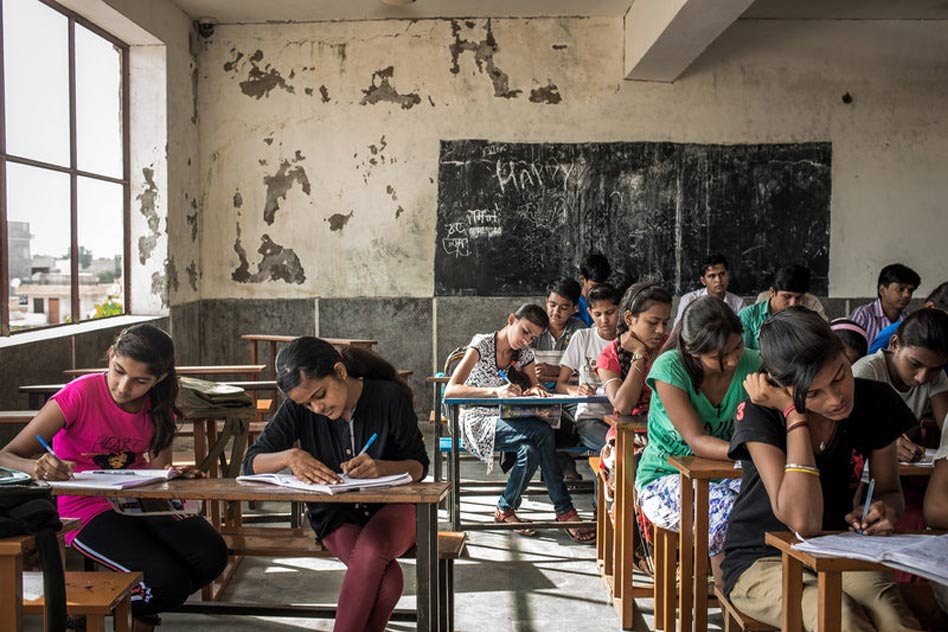 (There typically aren’t any high schools near the villages these girls are from. The Veerni Institute offers them free room, board and schooling in Jodhpur. Image: Poulomi Basu/VII Photo)
(There typically aren’t any high schools near the villages these girls are from. The Veerni Institute offers them free room, board and schooling in Jodhpur. Image: Poulomi Basu/VII Photo)
Around 15 million people live in western Rajasthan, 79% of who lead an extremely impoverished life in villages. The preference for male off springs to continue the family line and earn for the family means neglect of girl child. She is considered to be a burden as she cannot earn and has to be married off as soon as possible with a huge dowry. In addition, there is fear of sexual assault, thus slurring family honor. Hence, the prevalence of child marriage to incur minimum expenditure on someone who has to be sent off to the husband’s home, leading to sexual abuse, no power to voice themselves in both households and high female/ natal mortality rates.
The only saving grace is that a lot of child brides live with their parents till the age of 15 after which they go their husbands’ house. It is this gap which Veerni taps on in order to provide education to these young girls. Once they enter the in-laws’ home, they lose all their freedom. They have to obey without question or complaints.
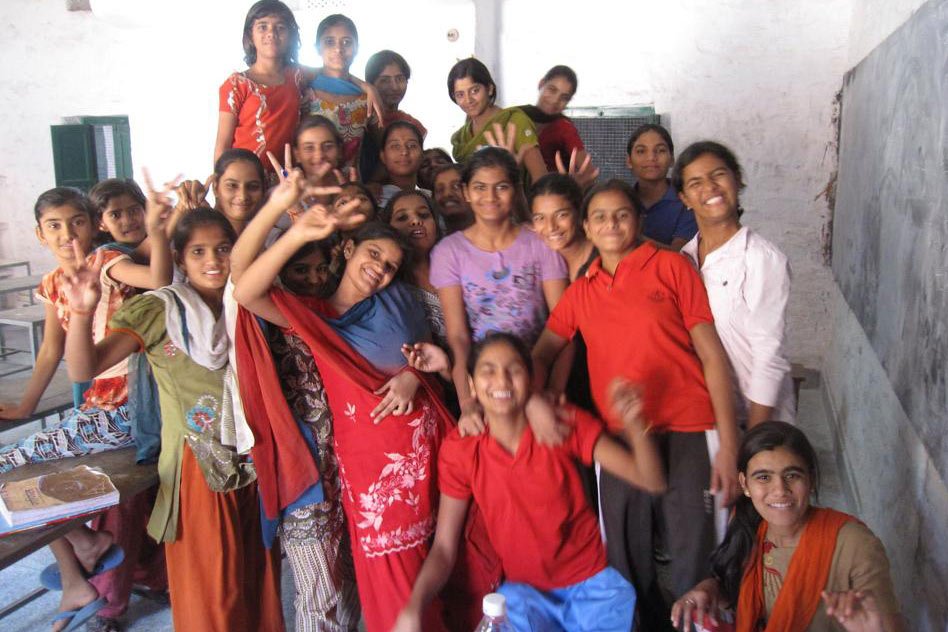
It is this time lag between a girl’s wedding and her Vidai (sending off to spouses’ homes) that Veerni capitalizes on to provide free education to child brides across Rajasthan. Primary schools in villages usually offer education till class 5th. There is hardly any provision for secondary or higher education. Veerni focuses on providing quality secondary education to girls without the interruptions of family life or matrimonial responsibilities, so as to help them become eligible for college education and degrees. “The idea was to help women to take part in the decision-making, and become the earning members of the family,” asserts Mahendra Sharma, Director of Veerni Institute.
No doubt it is an important step in empowering these ladies who now have a plethora of job positions open to them – community health workers, policewomen, bank clerk (if she has computer skills). If a woman is trained for an additional two to three years after high school, then she can become a teacher or a nurse, too, with more income. The government of India has reserved a lot of posts in government jobs for lower castes and a lot of these girls belong to those castes. Some clerical jobs require education only up to class 12th. They can apply for government jobs. They can thus become two hands to earn instead of one mouth to feed.
Even if a girl chooses not to join a job, her quality of life is improved. As an educated mother with knowledge about nutrition and hygiene she is better able to take care of her kids. “Women who are educated can raise their voice. They can participate in the decision-making of the family,” Sharma expressed in an interview with NPR.
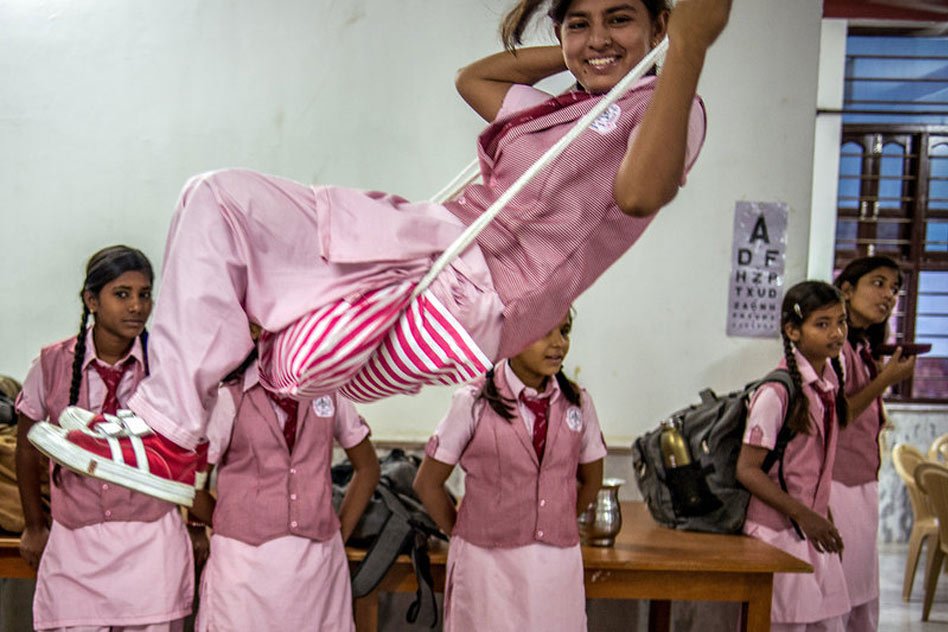 The girls take a break from the academic pressure. Some of the students were married by age 9 or 10. Image: Poulomi Basu/VII Photo
The girls take a break from the academic pressure. Some of the students were married by age 9 or 10. Image: Poulomi Basu/VII Photo
However, it was an uphill task to convince the parents to send their girls to schools, defying age-old traditions. Villagers were not in favor of educating girls as they thought higher education would make them “modern” and they would hang out with men of other castes and go for love marriages, something unacceptable to the community elders. They might even abandon village life, refuse marriage and choose to date other men, slandering the family name.
In one incident in the early days, men threw rocks at a jeep of Veerni volunteers. Therefore, they had to take a circuitous route by first teaching basic conventional skills to girls, like sewing and crafts making. In order to placate the villagers, they even provided free medicines to them. No mention was made of school education initially. After winning the trust of the villagers, group discussions with elderly women were undertaken to convince them about a literacy centre.
Around 40 villages were adopted, but there was another major hurdle – near absence of quality teachers in rural areas. Many students also failed in the national examinations.
The solution lay in taking these girls out of the hamlets to an urban area like Jodhpur where they could attend a private school. In 2005, Veerni made the shift, now functioning as a full-service boarding school which caters to the educational, medical and nutritional needs of the girls lodging there. In the first year the volunteers had to take the parents to the school boarding’s premises in order to show them all the facilities.
facebook/The-Veerni-Project
Once the girls returned after one year, they could manage to speak fluent Hindi as against the local dialect and this further impressed the parents. They exuded confidence and the locals realized that they could add to family income – they suddenly became assets, not burdens. Parents are now ready to delay sending the girls to their in-laws’ house and sometimes even break the marriage if a girl has a better prospect. Divorce is no longer a taboo. These girls, indeed, become “Veerni” (confident and empowered). Only 30 out of 70 girls currently lodging at the boarding school are married. There were 300 applicants last year, but only 70 could be accommodated.
Unfortunately, Veerni is cash strapped which proves to be a major hindrance in expanding the boarding facilities. Most of the funds come from family foundations in Switzerland and the United Kingdom and yet it amounts to a meager $ 125,000 annually. If they had more funds they could easily accommodate all the aspiring students. In case any of our community members would like to donate, please visit the link given below, although as of now one can donate only in dollars.
 All section
All section
 Girls start the day with a prayer at the Veerni Institute in Jodhpur, India. It’s a boarding school where nearly half the students are child brides.
Girls start the day with a prayer at the Veerni Institute in Jodhpur, India. It’s a boarding school where nearly half the students are child brides. 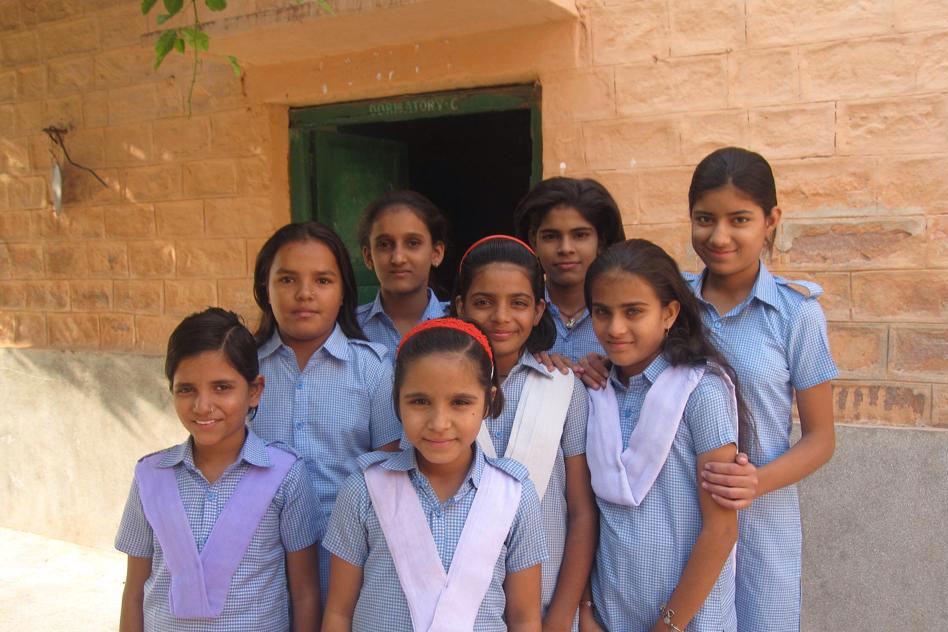
 (There typically aren’t any high schools near the villages these girls are from. The Veerni Institute offers them free room, board and schooling in Jodhpur. Image:
(There typically aren’t any high schools near the villages these girls are from. The Veerni Institute offers them free room, board and schooling in Jodhpur. Image:  The girls take a break from the academic pressure. Some of the students were married by age 9 or 10. Image:
The girls take a break from the academic pressure. Some of the students were married by age 9 or 10. Image: 